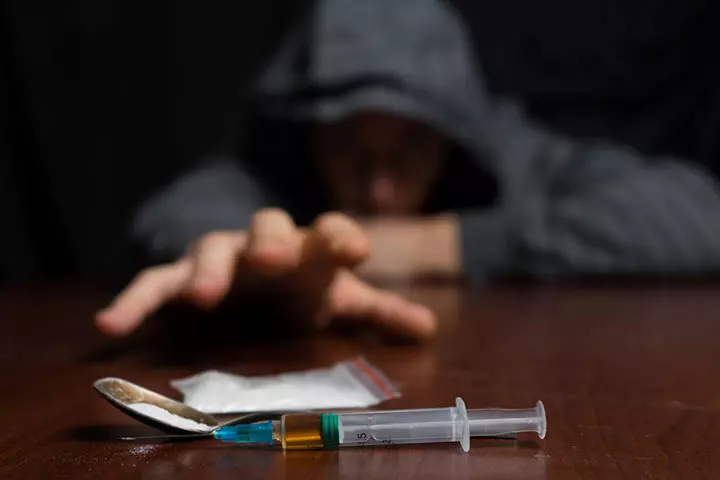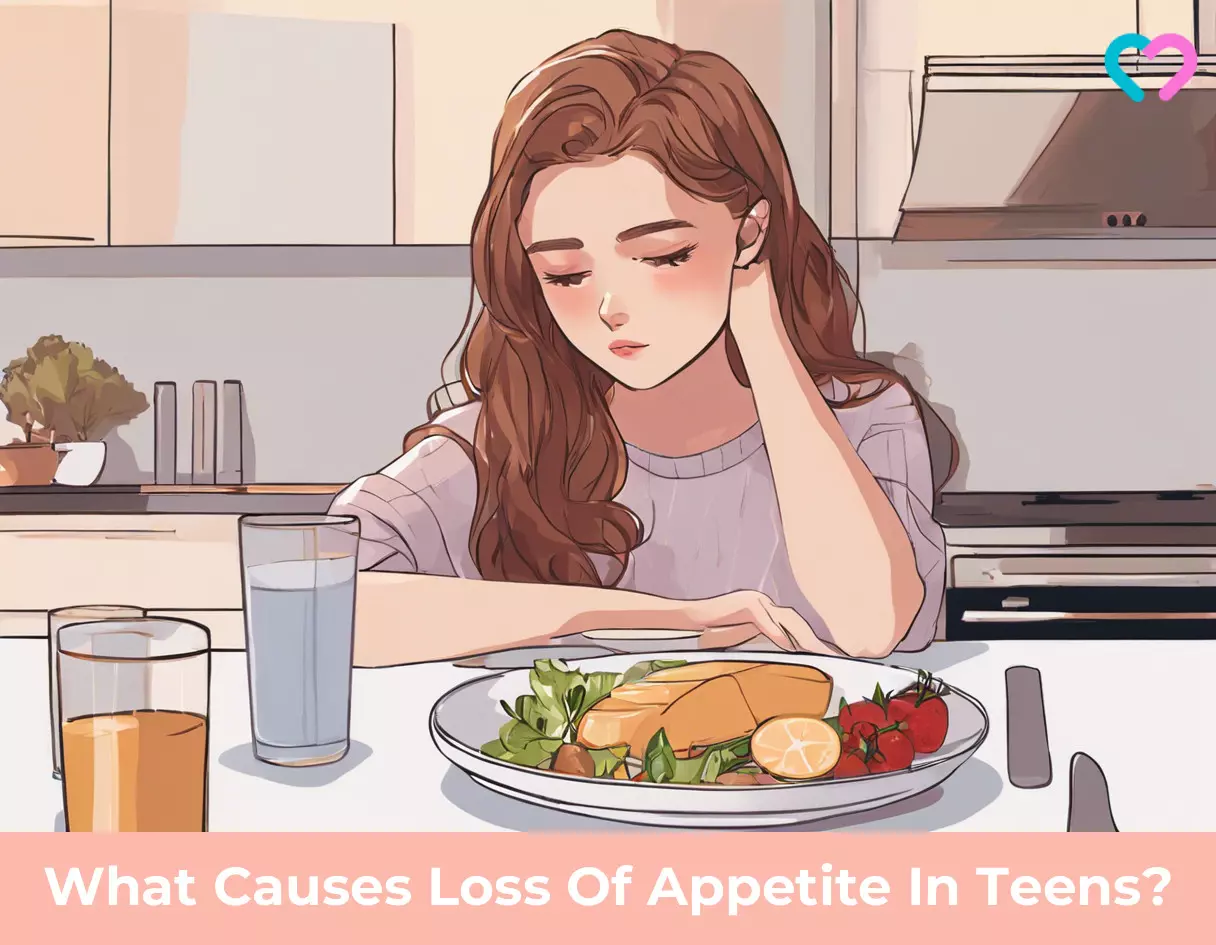
Image: Midjourney/ MomJunction Design Team
Loss of appetite in teens isn’t uncommon. A teenager undergoes several physical, psychological, and social changes during adolescence that can cause a teen to lose interest in food. Temporary loss of appetite is mostly benign and seldom a cause for concern. However, if a teen has chronic appetite problems, you can’t undermine the possibility of an underlying health condition. Chronic loss of appetite in teens can be a complex issue affecting their physical and emotional well-being. Understanding the factors contributing to this condition is crucial for parents and guardians to provide the necessary support.

Improper eating patterns can lead to nutritional deficiencies, which can cause several chronic health issues to emerge over time (1). Keep reading as we tell you more about appetite loss in teenagers, its possible causes, and more.
Key Pointers
- Teens often lose interest in food due to physical and psychological changes.
- This problem is usually temporary, but chronic appetite issues require consultation with a doctor.
- Loss of appetite can lead to weight loss, tiredness, irritable behavior, and severe health issues in teens.
- Changing dietary options, improving communication, and increasing awareness about healthy food may help improve appetite and intake levels.
When Is Loss Of Appetite A Concern In Teens?

It is not uncommon for teens to lose interest in food momentarily. Dr. Lilian Ablan Roldan, MD, a pediatrician from Brooklyn, New York, says, “Children and teenagers occasionally change their eating habits, which can be concerning for their families. Rapid height growth, high levels of physical activity, and hectic lifestyles can make it difficult for a young person to consume an adequate amount of food.”
According to the National Health Service (NHS), loss of appetite, along with the following symptoms, could be a cause of concern (2).
- Unexplained weight loss
- Persistent depressed mood with frequent tearfulness
- Irritable and intolerant behavior
- Little or no enjoyment of things that were interesting at some point
- Extreme tiredness or lack of energy and social isolation
- Unusual secrecy about eating habits
- Being anxious, upset, or guilty while eating
Washington-based registered dietitian Alicia Chacha Miller advises, “Parents should be mindful if appetite changes are accompanied by significant weight loss, fatigue, mood swings, unusual behaviors around food, sudden aversions to previously accepted foods, or physical symptoms such as nausea, abdominal pain, or difficulty swallowing.
“Prolonged appetite loss or behaviors like meal avoidance, preoccupation with calorie intake, or signs of body dissatisfaction may indicate a more serious issue, such as an eating disorder or underlying medical condition.”
Infographic: How To Improve Your Teen’s Appetite?
Some thing wrong with infographic shortcode. please verify shortcode syntaxWhat Are The Possible Causes Of Loss of Appetite In Teens?
Psychological causes
- Stress: The impact of stress on unhealthy eating may begin as early as the age of eight to nine years (3). Teen peer pressure, the pressure of keeping up with academics and sports, learning disabilities, problems at school, death or loss of a loved one, divorce of parents, or an unhealthy home atmosphere can cause stress in a teen’s life.
- Anxiety and depression: Some adolescents exhibit resilience to extreme levels of stress. However, it may lead to anxiety and depression in some teens (4). Appetite changes are common among teens experiencing anxiety and depression. According to the 2025 CDC Youth Risk Behavior Survey, 42% of US high school teenagers experienced persistent sadness or hopelessness. Some teens are also likely to display changes in sleeping patterns, a lack of interest in attending school, participating in their favorite activities, not socializing with friends, etc.
- Eating disorders: According to the American Academy of Child and Adolescent Psychiatry (AACAP), anorexia nervosaiAn eating disorder making people phobic about being overweight and obsessively conscious of what they eat and bulimiaiA chronic eating disorder that makes a person overeat and take extreme steps to avoid weight gain, like self-induced vomiting are two rising eating disorders (5). Both conditions lead to extreme weight loss and malnutrition due to nutritional deficiencies. Individuals with such eating disorders may develop unhealthy habits of forceful vomiting or using laxatives to lose weight. These eating disorders could develop due to psychological reasons like depression, self-esteem issues, or body image concerns such as an “extreme desire to look slim.” The latter is more commonly seen in girls.
Blogger Anita Tse suffered from anorexia nervosa during her teenage years. Sharing her experience, she says, “When I was between the ages of 13 and 15, I had an eating disorder called Anorexia Nervosa… I didn’t notice that anything was wrong, to begin with… One may say that anorexia is like an obsession with losing weight. To 13-year-old me, I was obsessed with seeing progress. I celebrated each inch shaved off my waist and pound lifted off the scale as a product of my determination and self-discipline (i).”
 Quick fact
Quick fact
Medical Causes
- Infections: Bacterial, viral, and fungal infections such as gastroenteritisiA bacterial or viral infection causing inflammation of the stomach and intestines or colitisiAn inflammatory bowel disease causing inflammation of the lining of the colon due to an infection or as an autoimmune reaction can lead to temporary loss of appetite in teens, resulting in poor nutrition. The loss of appetite in such cases is largely benign, and the appetite resumes as soon as the treatment is initiated (6). However, consult a doctor if your teen’s appetite does not improve even after the infection is treated.
- Chronic health issues: Chronic health conditions such as Crohn's diseaseiAn inflammatory bowel disease , irritable bowel syndrome, asthma, or hormonal conditions such as Addison’s disease could lead to a loss of appetite in teens (7). Food allergies, stomach problems and intolerances or sensitivities are other chronic issues that could cause a loss of appetite in some adolescents.
- Medications: Loss of appetite is one of the common medication side effects, such as antibiotics. Sometimes the loss of appetite is caused by constipation or diarrhea caused by these medicines. Medications prescribed for conditions such as autismiNeurological condition that causes developmental disabilities and ADHD are also associated with decrease or loss of appetite. Other causes include pain, fatigue, and weakness, or weight loss caused by the treatment of a medical condition such as cancer (8) (9) (10).
- Substance abuse: The World Health Organization (WHO) describes substance abuse as the harmful or hazardous use of psychoactiveiA drug that affects the functioning of the brain and causes changes in mood or behavior substances. These substances are alcohol and illicit drugs (11). Prolonged use of such substances is known to cause loss of appetite due to side-effects. Moreover, loss of appetite in such cases also happens due to the substance dependence at large (12).

By understanding the possible cause for loss of appetite, you can help your teen improve their appetite.
How To Improve Your Teen’s Appetite?
You can help your teen tackle the potential cause or causes of loss of appetite. Dr. Roldan adds, “Maintaining modest but nutritious portions can help a young person avoid feeling overwhelmed by food. If your child cannot finish the meal, completing the carbohydrate and protein portions of the meal may be more important than the vegetables at this time. Avoid labeling foods as healthy or unhealthy; all foods can be healthy depending on the individual’s needs. There are no such things as bad foods.”
Below are some steps that you could follow.
- Monitor eating patterns and behavior: Observe changes in your teen’s eating habits, weight, or energy levels. Pay attention to signs of emotional distress, secrecy around meals, or other behaviors that might suggest disordered eating.
- Communication: Acknowledge your teen’s concerns and talk to empathize with them. It will give them the motivation to share their issues with you. If your teen still isn’t sharing much with you, then do not hesitate to go to a doctor or psychologist (13). Unless the right cause is identified, the teen’s diet might not improve.
- Dietary changes: You can also try some dietary changes. While you plan their meal plan, split three large meals into five to six smaller meals with snacks. You can consider serving them high calorie, nutrient-dense options like homemade fruit smoothies, protein drinks, and multigrain porridges or pancakes. Ensure they do not skip meals and are staying away from junk foods like soda, high-sugar high-fat processed foods like chips, finger chips, etc. (14). Also, eat together as a family to build a positive atmosphere for your teen. Serve foods that your teen enjoys.
 Quick tip
Quick tip- Exercise: Regular exercise could potentially help stimulate appetite. Exercise helps burn calories, which is a physiological process for the development of hunger. It also releases endorphins, a feel-good hormone that might help in hunger stimulation. A bonus benefit of exercise is that it can help cope with depression (15) (16). Therefore, encourage your teen to exercise. If exercise seems boring, then suggest that they play their favorite outdoor sport like basketball, badminton, tennis or swimming, etc.

- Educate about healthy weight: Speak with the teen about the possible complications that could arise due to poor appetite. This method can be helpful in cases where the loss of appetite is due to eating disorders and self-imposed restrictions on food. Parents can consider taking the support of professionals who could counsel your teen and help them know about eating right. A counselor can also help a teenager understand the difference between healthy weight and an imaginary desirable size figure.
- Awareness about health risks: Some teenagers might also use products such as laxativesiA type of drug that helps relieve constipation by improving bowel movements , diureticsiA type of drug that increases the production and flow of urine , and diet pills to lose weight and curb appetite. These products could cause loss of appetite in teens while also leading to harmful effects and irreversible health risks. Therefore, teenagers must be made aware of these risks and their negative effects.
Parental intervention, along with medical help, can help in timely diagnosis and treatment of the underlying cause of loss of appetite.
How To Treat Loss Of Appetite In Teens?
Treatment of loss of appetite largely depends upon its cause. Below are some possible treatments that could be decided upon consultation with a doctor.
- Talking therapies: If loss of appetite in teens is due to depression or anxiety or any other psychological issue, then talking therapies might be prescribed by the doctor. This helps the teen to vent out, which relaxes the emotions and could possibly stimulate hunger. The doctor might also prescribe some antidepressants, too, in severe cases (17).
- Cognitive-behavioral therapy: CBT is used as a prominent therapeutic tool in cases of chronic loss of appetite in teens due to an underlying eating disorder. This form aims to address the underlying cognitive distortions and associated behavioral problems to enhance the teen’s quality of life (25).
- Nutritional supplements: Nutritional supplements help in cases where the loss of appetite is due to vitamin and mineral deficiencies. Some of the common nutritional supplements used are vitamin B complex, zinc, thiamine, and fish oil. Always consult a doctor before giving any nutritional supplement to your teen.
 Quick fact
Quick fact
- Appetite stimulants: In cases where the loss of appetite is due to a chronic ailment, then the doctor might suggest appetite stimulants, which increase appetite. The three major drugs that are currently approved by the FDA are megestrol acetate, oxandrolone, and dronabinol (18). However, their use in teens needs to be discussed with a doctor.
- Home remedies: Parents can also consider a few home remedies. You may try some appetite-boosting foods such as cardamom, herbal teas, cayenne pepper, cloves, fennel, garlic, ginger, ginseng, and green tea. However, there is limited scientific consensus on the efficacy of these home remedies. In case your teen is on medications, then you must consult a doctor before trying any home remedies.
Immediate medical assistance is suggested when the loss of appetite is due to substance abuse, eating disorders like anorexia or bulimia or depression. Chronic loss of appetite could lead to health complications or metabolic disorders depending upon the cause and its severity.
Possible Health Risks Of Loss Of Appetite In Teens
Loss of appetite in teens usually resolves without long-term health concerns. However, if it continues for a prolonged time, then it may cause serious health risks or complications, as mentioned below (19) (20).
- Malnutrition impacting the growth and development of the teen
- Poor weight in accordance with the height
- Extreme fatigue impacting day-to-day activities
- Hormonal imbalances leading to delay in puberty and disturbed menses in girls
- Impaired bone mass
- Muscle wasting
- Irregular heartbeat
- Shortness of breath
- Fever
- A general ill feeling
Tips To Encourage Healthy Eating Habits in Teens
Teenagers often have changing appetites and food preferences, so parents need to guide them toward healthy eating. Here are some simple tips to help your teen build good eating habits that can last a lifetime:
- Be a role model and display healthy eating practices. Teens are likely to follow the examples set by their parents/caregivers.
- Avoid force-feeding. Gently encourage eating without making it a point of conflict. Having meals together is a great way to educate teens about healthy eating.
- Serve balanced meals containing various foods from different food groups. Use these foods to prepare healthy meals and snacks from varied cuisines to ensure variety in meals.
- Give whole fruits or vegetables for snacking. A whole fruit, such as an apple or a bowl with veggie sticks and hummus, is a great choice.
- Keep easy-to-grab foods accessible. Some healthy options that you can stock up in your pantry or fridge include yogurt, nuts and seeds, and whole-grain crackers.
- Limit fruit juice or carbonate beverage intake. Encourage consumption of water and nutritious beverages, such as coconut water.
- Involve them in meal planning, grocery shopping, and cooking. Let your teen choose recipes and cook with you to spark interest in food.
In addition, supporting a teenager in managing stress through mindful activities and meditation can also help promote healthy eating habits.
Frequently Asked Questions
1. How long does the loss of appetite usually last in teens?
The duration of appetite loss in teens depends on the underlying cause. If the condition is caused due to stomach problems or infections, it may go away in a few days as the infection is treated or resolved. However, if anxiety or depression is the cause, it may take careful management of the condition and a longer time.
2. How can parents help their teens cope with the emotional effects of appetite loss?
Depression is often related to loss of appetite. If symptoms of depression, such as loss of interest, sleep problems, or irritability, accompany appetite changes, try providing emotional support to your child. Validate their emotions and avoid being judgemental. Help them develop positive feelings and talk to them about their problems. Seek professional help if required (23).
3. How can parents differentiate between normal teenage behavior and loss of appetite?
Skipping meals once in a while may be a part of normal teenage behavior. Loss of appetite due to underlying problems, including psychological issues, will also present other symptoms. For instance, loss of appetite due to anorexia nervosa may be identified with symptoms such as feeling overweight despite being thin, fear of gaining weight, always counting calories, and feeling cold all the time (24). General fear of excess weight in teens may also lead to these symptoms.
The significant hormonal, physical, emotional, and psychological changes of adolescence cause many changes and may lead to loss of appetite in teens. It is not uncommon and mostly does not arise from something serious. However, if you notice unexplained or prolonged weight loss, persistent depression, or unusual isolation, you must talk to a healthcare provider. It is essential to determine the underlying cause of the disease to find treatment for the same. The doctor may prescribe therapy or medications to deal with the condition.
Illustration: What Causes Loss Of Appetite In Teens?

Image: Stable Diffusion/MomJunction Design Team
Personal Experience: Source
MomJunction articles include first-hand experiences to provide you with better insights through real-life narratives. Here are the sources of personal accounts referenced in this article.
i. Reverse engineering my 13 year old state of mind;https://medium.com/@anitamtse/reverse-engineering-my-13-year-old-state-of-mind-b70507014ca8
References
1. Christian P. and Smith E.R.; Adolescent Undernutrition: Global Burden, Physiology, and Nutritional Risks; Karger
2. Worried about your teenager?; NHS
3. Hill DC et al.; Stress and eating behaviors in children and adolescents: Systematic review and meta-analysis.; National Center For Biotechnology Information
4. Anyan F and Hjemdal O; Adolescent stress and symptoms of anxiety and depression: Resilience explains and differentiates the relationships.; National Center For Biotechnology Information
5. Eating Disorders in Teens; American Academy of Child and Adolescent Psychiatry
6. Gustav van Niekerk et al., Sickness-Associated Anorexia: Mother Nature’s Idea of Immunonutrition?; National Center For Biotechnology Information
7. Appetite – decreased; Medline Plus; U.S. National Library of Medicine
8. Daniel S. Childs and Aminah Jatoi; A hunger for hunger: A review of palliative therapies for cancer-associated anorexia; National Center For Biotechnology Information
9. Patra S et al., Atomoxetine for attention deficit hyperactivity disorder in children and adolescents with autism: A systematic review and meta-analysis.; National Center For Biotechnology Information
10. Sturman N et al., Methylphenidate for children and adolescents with autism spectrum disorder.; National Center For Biotechnology Information
11. Substance abuse; WHO
12. Drug-Abuse-Prevention-4-Teens; United States Department of Justice Drug Enforcement Administration
13. Tips for Communicating With Your Teen; Child Mind Institute
14. Nutrition Problems and Their Solutions; Cleveland Clinic
15. Exercise and mood; Victoria State Government
16. Exercise is an all-natural treatment to fight depression; Harvard Health Publishing
17. Nutrition in Middle Childhood and Adolescence; National Center For Biotechnology Information
18. Drugs and Appetite; Sagepub
19. Jeffrey M Brown et al., Medical complications occurring in adolescents with anorexia nervosa; National Center For Biotechnology Information
20. Eating disorders in adolescents: Principles of diagnosis and treatment; National Center For Biotechnology Information
21. Eating Disorders; Nemours
22. Is Your Body Trying to Tell You Something? Possible Nutrient Inadequacies and Deficiencies; EatRight
23. What to Do if You Think Your Teenager Is Depressed ; Child Mind Institute
24. For Parents: Eating Disorders in Teens; American Academy of Family Physicians
25. Denise E. Wilfley et al.,Cognitive Behavioral Therapy for Weight Management and Eating Disorders in Children and Adolescents; Child and Adolescent Psychiatric Clinics of North America
Community Experiences
Join the conversation and become a part of our nurturing community! Share your stories, experiences, and insights to connect with fellow parents.
Read full bio of Dr. Elna Gibson
- Alicia Chacha Miller is a registered dietitian specializing in maternal and pediatric nutrition. She holds an MS in Nutrition Science from the University of Southern California and founded Cardamom Nutrition.
 Alicia Chacha Miller is a registered dietitian specializing in maternal and pediatric nutrition. She holds an MS in Nutrition Science from the University of Southern California and founded Cardamom Nutrition.
Alicia Chacha Miller is a registered dietitian specializing in maternal and pediatric nutrition. She holds an MS in Nutrition Science from the University of Southern California and founded Cardamom Nutrition.
Read full bio of Swati Patwal
Read full bio of Rohit Garoo
Read full bio of Shinta Liz Sunny

















